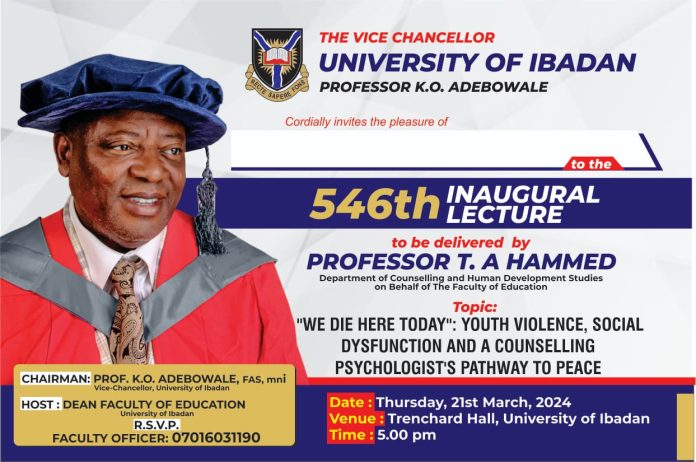
‘’WE DIE HERE TODAY’’: YOUTH VIOLENCE, SOCIAL DYSFUNCTION AND A COUNSELLING PSYCHOLOGIST’S PATHWAY TO PEACE.
My inaugural lecture, “We Die Here Today’’: Youth Violence, Social Dysfunction and a Counselling Psychologist’s Pathway to Peace”, discusses how counselling psychological principles and practices can be used to foster peace among Nigerian youths. In addition, it displays the persistent issues of youth violence, radicalization, secondary school cultism, consequences, and risk factors.
It also highlights recent national issues and challenges associated with youth violence and social dysfunction. While it is not my wish for anyone to die, nevertheless we must survive to find peace in dangerous times.
The lecture is presented in two interrelated parts: counselling psychology, youth aggression, and peace studies and my stewardship as a lecturer of counselling psychology for the last 28 years.
Nigeria’s youth population is quickly growing in an urbanizing and modernizing nation, with varying nationalities and cultures. These socially and politically active youngsters have varied education and vocations, and they face unique future problems and opportunities.
However, Nigerian youth are typically excluded from political administration and held down by unhappiness, hopelessness, unproductivity, or psycho-socio-emotional imbalance, which typically produce exclusionary violence.
Adolescent radicalisation, the first step in violence mobilisation, must be addressed. We must characterize radicalization as violence, as it can be violent or passive.
State-sponsored violence and its backgrounds are often overlooked, and framing violence as an abstraction rather than a lived experience does not help. Youth and state-sponsored violence must be considered to understand its effects on daily life.
Teen violence and social dysfunction must be averted by addressing its causes, which can affect society’s cohesion, economic growth, public health, and well-being. Government, community, education, healthcare, and law enforcement must unite to end youth violence and societal disintegration. Preventive, early action, community participation, and socioeconomic equity are needed for community safety, resilience, and success.
School and community counselling psychologists are essential for preventing teenage violence and social dysfunction. Knowledge of human emotions, behaviour, and linkages promotes harmony and helps prevent violence
Counselling psychologists evaluate psychological causes, spaces, and behaviours, while victim and offender interviews, potential observation, and careful interpretation of social actor and practice testimonies are significant in combatting youth violence. Hence a need for counselling psychology in all institutions and areas where the youth are prominent.
My focus as a university lecturer for the past 28 years has been on finding solutions to the besetting problem of youth violence by applying counselling psychological principles and practices. The projects I have been privileged to participate in provide evidence that the application of these principles can serve to equip the youth to shun violence. My foray into peace studies has further enhanced my capabilities and provided further opportunities for proffering peaceful solutions to conflicts and violence not only in the university setting but in secondary schools and communities both in the South and the North.
The lecture also examines how psychological concepts and practices affect public and private sector employee behaviour and job performance, in addition to adolescent and youth psychosocial challenges.
This lecture concludes with recommendations to address youth violence-related issues and provides remedies.
Quality Education: Ensuring smooth and better access to quality education for all Nigerian youth is crucial. Education equips them with knowledge, critical thinking skills, and opportunities for personal growth. The Nigerian government should focus on youth welfare by upgrading existing institutions and constructing viable ones, such as community training centres. Functional and effective institutions are crucial for preventing violence and promoting human security.
The establishment of a National Crime Prevention Commission charged with peace education that can provide national leadership on effective ways to prevent and reduce crime. Peace education can help prevent youth violence and radicalism by teaching youth about the advantages of peace and conflict transformation skills. It should be incorporated into the education curriculum at all levels.
Awareness and education are pivotal to ending cultism in lower institutions. Government could partner with private organizations and strengthen early warning systems to curb youth violence. Parents, teachers, guardians, and siblings should also be educated on identifying red flags indicating a child is joining a cult or being bullied.
Positive Role Models: Leaders in the nation should set good examples for the youth. Their actions and behaviour influence young people. When leaders demonstrate respect, empathy, and non-violence, it positively impacts the youth.
Economic Empowerment: Addressing the nation’s economic problems is vital. High unemployment rates contribute to frustration and violence among young people. Programmes that promote self-employment, vocational training, and job creation can empower the youth economically. In addition, policies to manage population while discouraging population growth could also be implemented.
Social Welfare Programmes: Implementing social welfare packages specifically designed for the youth can provide safety nets. These programmes may include financial assistance, healthcare, and support for vulnerable youth. The economic situation in Nigeria is causing psychologically-absent parents to prioritize their careers over their children, which contradicts the objective of wage increases. Providing Social Safety Net Mechanisms could help parents financially and enable them to devote more time to their children.
Youth Mentoring and Skills Development: Establishing teen mentoring, apprenticeship, and leadership programmes can guide young individuals toward positive paths. Life skills training and mentorship help build resilience and prevent violence. Partnering with private organizations and strengthening early warning systems are also necessary to curb youth violence.
Community-Based Approaches: Engaging local communities through peace committees, peace education, and early response mechanisms can prevent violence. Mediation and restorative justice systems play a crucial role in conflict resolution. Distancing violent behaviour from cultural traditions and cultures through alternative social education and a socialization process that frowns at violence is essential.
Mr Vice Chancellor Sir, I submit that reducing youth violence requires a collective effort from government, civil society, communities, families, and individuals. And as I have demonstrated, counseling psychologist can play a vital role in every step of the way in working to prevent youth violence. Finally, Nigeria must invest in youth development, education, and providing economic opportunities for its large population of young people if she is to have a safer and more prosperous future.
Professor Ayo Hammed, is a Professor of Counselling Psychology/Peace Studies Department of Counselling and Human Development Studies, University of Ibadan.















